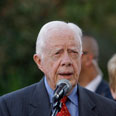
Jimmy Carter: The US president who put on the pressure
Moments before Obama's anticipated visit, minutes covering Israel-Egypt peace accord negotiations are released by state archives. They include tense meetings between Begin and Carter, last minute disagreements and the final OK
The visit was intended to close a gap; its end the signing of a historic peace agreement between Israel and Egypt. Thirty four years after the Israel visit of Jimmy Carter and just ahead of the visit of President Barack Obama, the state archives released the protocols of the dramatic conversations that took place on the road to the signing of the treaty.
Carter arrived in Israel a year and a half after Egyptian leader Anwar Sadat visited the country, and a half year after the signing of the Camp David Accords. The background to the visit, as was then assumed in Israel, was the US’ need to create new stability in the Middle East, following the fall of the Shah of Iran.
Related stories:
The understanding of the Foreign Ministry at the time was that Carter wanted to solidify relations between the US and Egypt. The peace agreement with Israel was the way to do so. Obstacles that stood in the way: the presence of Egypt in Gaza, the autonomy of the Palestinians and the issue of oil. At the time, the supply of oil from Iran to Israel was possible because of the revolution in Tehran. Israel would now have to relinquish the oil fields in Sinai.
In a discussion at the Foreign Ministry regarding Carter’s upcoming visit, Foreign Minister Moshe Dayan was asked, “As far as Carter is concerned, is it a gamble, or a safe bet?” Dayan replied, “In both cases, whether he gets a peace agreement with Israel or he doesn’t, the move is right. He must establish the US’s relationship with Egypt… and which country will help it ensure stability to avoid decline, as there was in Iran. They need Egypt and Egypt needs them.”
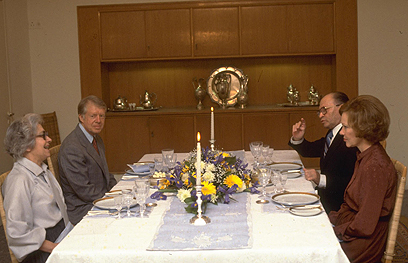
Carter, Begin and their wives (Yaakov Saar, GPO)
On March 10, 1979, Carter landed in Israel. In a tense meeting between the two country’s leaders, Prime Minister Menachem Begin told the president that Israel would not be able to sign the agreement during his visit, as long as a discussion regarding the autonomy of the territories was still underway in the Knesset. US Secretary of State Cyrus Vance gave Dayan a memorandum of understanding, including an American guaranty for oil.
Carter asked to complete the deal
The Israeli delegation headed by Begin met with President Carter and his entourage on March 11, 1979. Carter told Begin that he was sharing understandings based not only on the point of view of the US, but on his personal impressions from meeting Sadat.It was Carter’s belief that the people of Egypt were ready for peace. He told Begin that Sadat was happy the period of negotiations was reaching an end. But Carter also admitted his worry that if negotiations did not succeed during that visit, it was doubtful they would ever be completed.
Carter further emphasized that Sadat was under pressure, with Saudi Arabia threatening to stop the supply of oil to Egypt. This, he said, was compounded by embargos similar to those Israel was dealing with.
Additionally, according to Carter, the Arab world was convinced that Israel wanted to put off the plan for Palestinian autonomy. The call of Agricultural Minister Ariel Sharon to settle 1.5 million Jews in the West Bank caused Carter himself to become suspicious.
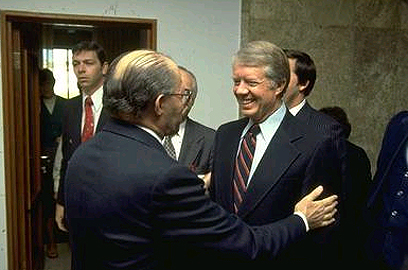
Begin and Carter (Yaakov Saar, GPO)
“Autonomy is an Israeli plan,” Begin replied, saying that the government stood behind it.
The next day there was another meeting, this time with the entire government of Israel appearing before Carter. Carter asked Israel to make additional concessions concerning the presence of Egypt in Gaza and an early Israeli withdrawal from the field, as a condition for establishing diplomatic relations.
Begin disagreed, saying that in any case, the sections of the agreement dealing with normalization ensured Egypt access to Gaza after the signing, and thus he suggested, “to leave the door open and if Jordan does not join the discourse, we will speak with Egypt alone.”
Carter was not happy. He emphasized to Begin that it was a critical issue and he was not satisfied with his reply.
“With respect, mister president, it is not written in the Camp David accords,“ Begin replied.
Carter said he needed assurances for his negotiations team that they would have access to the residents of Gaza and the West Bank. His worry, Carter said, was that he would not fulfill his responsibilities to the American public, the Palestinians or Egypt, under any other circumstances.
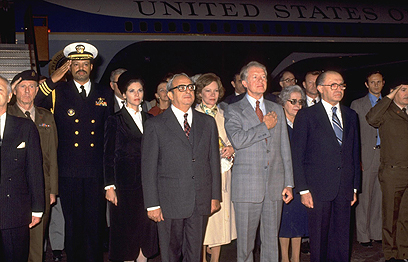
Carter and Begin (Yaakov Saar, GPO)
Begin replied, “Mister president, we will sign only that which we agree to sign and not anything with which we do not agree. I am getting the impression that we are obligated to sign, no sir – if we agree, we will sign. Only if we agree. That is a pre-condition. What I am saying is that we will vote in full on what is written in the agreement. I repeat this: It is not written in the Camp David Accords that Egyptian liaison officers must be in Gaza or that Jordanian liaison officers must be in the West Bank.”
In the end, Secretary of State Vance made a surprising offer – both the issues over which there was disagreement – the presence of Egypt in Gaza and the oil – would not appear in the agreement. This was exactly what Israel wanted.
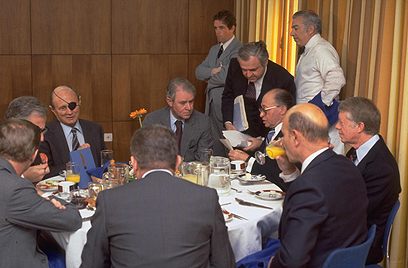
Negotiations in Jerusalem (Yaakov Saar, GPO)
The Best News of My Life
Within the minutes revealed by the archives there is a March 14 telephone conversation between Carter and Begin. “I have good news for you,” Begin said. “The two significant clauses were settled and received the agreement of the majority of the cabinet.”
Carter replied that it was indeed wonderful news, calling it the best news he had ever heard.
On March 22, 1979, the peace agreement with Egypt was approved by the Knesset. The official signing ceremony was held four days later on the lawn of the White House.
- Receive Ynetnews updates directly to your desktop










